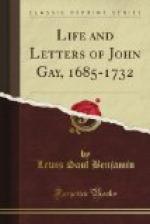All this seems modern preface, where we’re
told
That wit is praised, but hungry lives
and cold:
Against th’ ungrateful age these
authors roar,
And fancy learning starves because they’re
poor.
Yet why should learning hope success at
Court?
Why should our patriots virtue’s
cause support?
Why to true merit should they have regard?
They know that virtue is its own reward.
Yet let me not of grievances complain.
Who (though the meanest of the Muse’s
train)
Can boast subscriptions to my humble lays,
And mingle profit with my little praise.
What to do with the thousand pounds—a sum certainly far larger than any of which he had ever been possessed—Gay had not the slightest idea. He had just enough wisdom to consult his friends. Erasmus Lewis, a prudent man of affairs, advised him to invest it in the Funds and live upon the interest; Arbuthnot advised him to put his faith in Providence and live upon the capital; Swift and Pope, who understood him best, advised him to purchase an annuity. Bewildered by these divergent counsels, he did none of these things. Just when he was confronted with the necessity of making up his mind, Pope’s friend, James Craggs the younger, of whom he wrote in “Mr. Pope’s Welcome from Greece":—
Bold, generous Craggs, whose heart was ne’er disguised,
made him a present of some stock of the South Sea Company, at the same time, no doubt, telling him that in all probability it would rise in value. Here was a chance, dear to the heart of this hunter after sinecures, of getting something for nothing—or next to nothing. With his thousand pounds he purchased more South Sea stock. At what price Gay bought it is impossible to say, but it is not unlikely that Craggs’ present was made in April, 1720, when the first money-subscription was issued at the price of L300 for each L100 stock. The poet’s good fortune was at this moment in the ascendant. A mania for speculation burst over the town, and everybody bought and sold South Sea stock. In July it was quoted at L1,000. If Gay had then sold out he would have realised a sum in the neighbourhood of L20,000. His friends implored him to content himself with this handsome profit, but in vain. As Dr. Johnson put it, “he dreamed of dignity and splendour, and could not bear to obstruct his own fortune."[2] He who a few months ago had been practically penniless, could not now bring himself to be satisfied with an income of about a thousand a year. Realising that it was impossible entirely to overcome his obduracy, his friends then begged him at least to sell so much as would produce even a hundred a year in the Funds, “which,” Fenton said to him, “will make you sure of a clean shirt and a shoulder of mutton every day.” Gay was not to be moved from his resolve to become a great capitalist. Arguments were of no avail. The wilful man finally had his way. Almost from the moment he refused to yield to his friends’ entreaties the price of South Sea stock declined rapidly. The “Bubble” burst, and in October South Sea stock was unsaleable at any price. Gay lost not only his profit but his capital, and was again reduced to penury.




